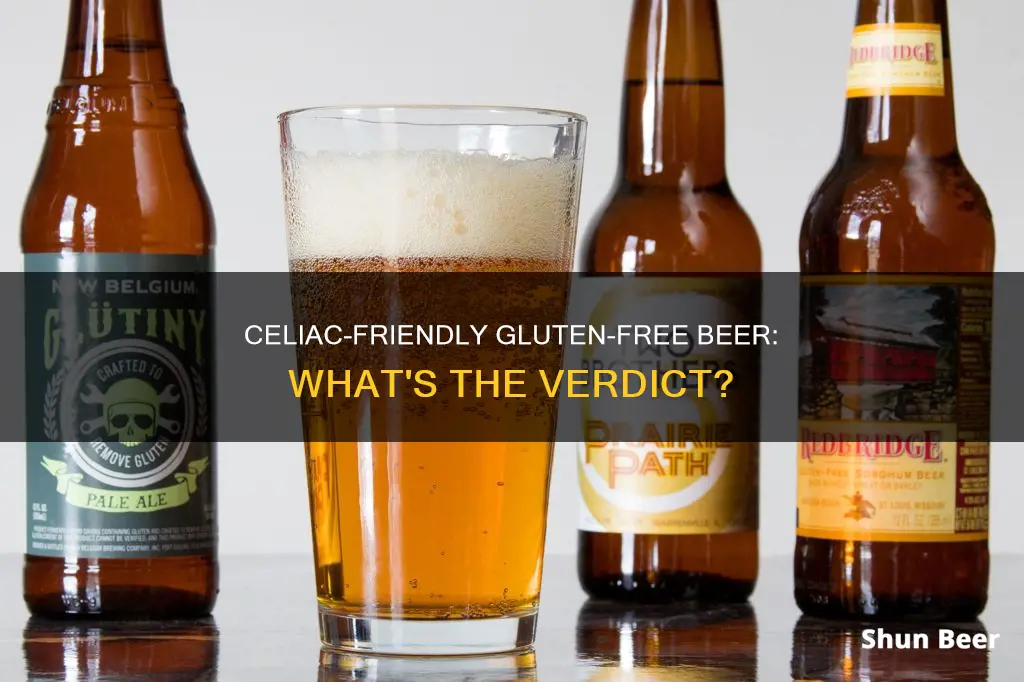
Celiac disease is an autoimmune condition where the body triggers inflammation in the small intestine when gluten is consumed. This can cause iron-deficiency anemia and an itchy skin rash, among other symptoms. The only treatment is to remove gluten from the diet. Conventional beer is not gluten-free as it is usually made from barley and wheat, which both contain gluten. However, there are gluten-free beers available that are made with alternative grains such as sorghum, buckwheat, millet, and rice. These beers are generally considered safe for people with celiac disease, although some people still experience adverse symptoms. There is also gluten-removed beer, which is made with gluten-containing grains and then processed to remove the gluten. These beers are not recommended for people with celiac disease as they may still contain gluten fragments and can trigger symptoms.
Can Celiacs Drink Gluten-Free Beer?
| Characteristics | Values |
|---|---|
| Conventional beer | Not gluten-free |
| Gluten-free beer | Made with grains that don't contain gluten, such as sorghum, buckwheat, millet, and brown rice |
| Gluten-removed beer | Not recommended for people with celiac disease |
| Beer labelling | By law, manufacturers can only label a beer gluten-free if it contains 20 ppm or less of gluten |
| Celiac disease | An autoimmune condition that damages the lining of the small intestine when gluten is consumed |
What You'll Learn

What is the difference between gluten-free and gluten-removed beer?
Gluten-free beer is made with gluten-free ingredients such as sorghum, buckwheat, millet, and quinoa. These beers are brewed without wheat or other related grains and are safe for people with celiac disease.
Gluten-removed beers, on the other hand, are made with traditional ingredients like barley, which contains gluten. Brewers use an enzyme called Clarex to break down gluten proteins into smaller pieces. This process does not remove the gluten but makes the molecules too small to be detected in laboratory tests. While these beers are labelled as 'gluten-reduced', experts recommend that those with celiac disease avoid them.
The main differences between gluten-free and gluten-removed beer are in the ingredients and the taste. Gluten-free beers use alternative grains, which can result in a sweeter taste or a less carbonated beverage. Gluten-removed beers, on the other hand, taste more like traditional beers because they are made with wheat or barley.
While gluten-removed beers are considered safe for people with gluten intolerance in Europe, the U.S. government prevents brewers from labelling them as "gluten-free".
Mixing Beer and Cough Medicine: Is It Safe?
You may want to see also

Is gluten-removed beer safe for people with celiac disease?
People with coeliac disease must follow a strict gluten-free diet. Even a tiny amount of gluten can cause a reaction, so it's important to be cautious when choosing gluten-free products.
Gluten-removed beers are made with traditional ingredients like barley, which naturally contain gluten. Brewers then use various enzymes to break down the gluten, aiming to reduce the final product's gluten content to below 20 parts per million (ppm).
The current consensus is that gluten-removed beers are not safe for people with coeliac disease. While these beers may taste more like traditional beers, they can trigger adverse symptoms in people with coeliac disease. Methods of gluten testing used for food are not useful for testing gluten-removed beers. The process that brewers use to break down gluten proteins is called hydrolysis, and there is no way to check the gluten level of drinks that are partially broken down in this way.
A 2017 study by the Gluten Intolerance Group (GIG) found that gluten-reduced beer elicited an immune response in almost 10% of celiac blood samples. This indicates that there are residual gluten peptides that may be specifically recognised by people with coeliac disease.
Until more studies are conducted, gluten-removed beer is not recommended for people with coeliac disease. Beers labelled as gluten-free are generally considered safe for people with coeliac disease.
Can Christians Drink Beer? Exploring Religious Boundaries
You may want to see also

What are some examples of gluten-free beers?
Celiac disease sufferers can drink beer that is labelled as gluten-free. However, they should avoid gluten-removed beers, which are not considered safe for those with celiac disease.
Buck Wild Pale Ale
A craft beer with a rich, nutty character and subtle hop bitterness. It is brewed with buckwheat and millet and has a crystal clear light golden colour.
Glutenberg Blonde Ale
This ale is meticulously crafted with millet and buckwheat, achieving a harmonious balance of flavours. It has a light body and a crisp taste.
Redbridge Gluten-Free Lager
A slightly sweet lager with healthy carbonation and a crisp, clean taste. It is made without wheat or barley and has a 4.8% ABV.
BuckWit Belgian by Holidaily Brewing Co.
A Belgian-style brew crafted without wheat or gluten-containing grains. It employs millet and buckwheat to achieve a nuanced flavour profile with citrusy and spicy notes.
ALT Brew Copperhead Copper Ale
A gluten-free ale with a rich copper hue and a well-balanced taste with notes of caramel and toffee, followed by a smooth finish. It pairs well with grilled meats or hearty stews.
Roasted Coffee Ale by Burning Brothers
A unique brew that blends the richness of ale with the boldness of roasted coffee. It has a deep, dark colour and an aroma of freshly roasted coffee beans. The flavour profile offers a malty sweetness and coffee bitterness.
Shrouded Summit Belgian White Ale by Ghostfish Brewing
A hazy, straw-coloured ale with a flavour profile featuring Belgian yeast spiciness, coriander, and orange peel. It has a refreshing taste with citrus notes and a wheat malt backbone.
Blonde Ale by New Planet Beer
A pleasant and easy-drinking blonde ale with a light malt sweetness and a smooth, clean finish. It has a clear golden colour and a fluffy white head.
Dark Ale by Ground Breaker Brewing
A rich and toasty dark ale with notes of chocolate and coffee. It has a deep brown colour and a tan head. This beer provides a robust and satisfying experience.
La Grosa Rita Margarita-Style Ale
An award-winning gluten-free beer with a lime-forward flavour, a bit of agave and orange sweetness, and a hint of sea salt. It is light and refreshing, with a 4.5% ABV.
Minors Drinking Beer at Home: What's the Legal Stand?
You may want to see also

What are some examples of gluten-removed beers?
While gluten-removed beers are not recommended for people with celiac disease, there are a few on the market. Here are some examples:
- Alley Kat Scona Gold Kölsch
- Brunehaut Bio Tripel
- Estrella Damm Daura Marzen
- Lammsbräu Glutenfrei Lager Beer
- Mikkeller American Dream Gluten Free
- New Belgium Glutiny brand Golden and Pale Ales
- Peroni senza Glutine (Lager)
- Widmer Omission Lager
- Widmer Omission Pale Ale
- Wold Top Against The Grain
- Wold Top Marmalade Porter
- Wold Top Scarborough Fair IPA
Gluten-removed beers are made from traditional beer ingredients like barley, wheat, or rye and then processed using enzymes to break down the gluten. However, the effectiveness of this process has not been scientifically proven, and there is a risk of adverse reactions for those with celiac disease or gluten intolerance.
Is Expired Beer Safe to Drink?
You may want to see also

What other alcoholic drinks are gluten-free?
Celiac disease can be a huge inconvenience, especially when it comes to drinking alcohol. While conventional beer is typically off the menu, there are plenty of gluten-free alternatives to choose from.
Wine
Wine is naturally gluten-free, as it is made from fruit. This includes regular red, white, or rosé wines, as well as sparkling wines, such as prosecco and champagne. Fortified wines, such as vermouth, port, and sherry, are also gluten-free. However, be wary of wines that contain added flavourings, as some of these may contain gluten.
Cider
Cider is also a good option for those avoiding gluten. Cider is a fermented fruit juice, usually made from apples, and is naturally gluten-free. However, some cider manufacturers may add gluten-containing ingredients to enhance the flavour, so be sure to check the label.
Spirits
All spirits are gluten-free. This includes brandy, rum, tequila, mezcal, gin, and whiskey. Vodka is also gluten-free, but be careful if it is flavoured, as additives may be added after distillation.
Gluten-free beer
There are also beers on the market that are made without gluten. Some are made from naturally gluten-free sorghum instead of barley or wheat.
Germans' Morning Beer Workouts: Fact or Fiction?
You may want to see also
Frequently asked questions
Yes, people with celiac disease can drink gluten-free beer. Gluten-free beers are made with grains that don't contain gluten, such as rice, sorghum, buckwheat, and millet.
Some gluten-free beer brands include Ghostfish Brewing Company, Glutenberg, Ground Breaker Brewing, and Holidaily Brewing Company.
Other alcoholic drinks that are gluten-free include wine, pure distilled liquors, hard ciders, and drinks made from fermented fruit juices. However, it is important to read the labels carefully as some ciders may contain barley.







